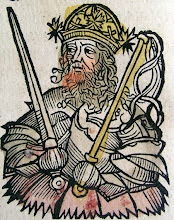

The Huns were a group of rebellious nomads that originated out of the Central Asian Steppes. They were a group of herdsman that wanted to expand their land, power, and their wealth. Wealth was how a Hun would gain recognition in his empire. The more gold and treasures the Hun had, the higher ranking he would be in the army (allempires.com). It is unsure what kind of people they were, but some historians say they were Xiong Nu, which were a group of people driven to the west by the Chinese. The Huns were trained to live and breathe on horseback ever since they were little boys. Eventually, as they all came together, they were determined to conquer all.
The Huns started in Mongolia, and moved west to China from there. In 432, the first leader of the Huns was Mao-tun. Mao-tun and the Huns first attempted to attack China and tried to conquer there, but what they did not realize is that China had been preparing for the Huns attack. In defense, China built the Great Wall to keep the Huns from entering. Right after this battle, a new ruler took over the Huns. His name was Rua. After they failed to conquer China, the Huns continued moving west towards Europe. In 434 B.C. Rua planned a massive invasion on the Eastern Roman Empire. But in the process of planning his attack, he was struck by lighting, and killed (allempires.com).
After Rua died, the Romans were happier then ever to hear the leader of the Huns was dead. But what they did not know was they were about to go through an invasion that would greatly influence the fall of the great Roman Empire. When Rua died, the men closest to him would take over the Hun Empire. This is when Attila took power. Attila was one of Rua's most favored nephews and was now the ruler of the Huns.
The first task Attila wanted to accomplish was to make the Eastern Roman Empire realize the power the Huns had. Attila made a treaty stating that he had all rights to a roman and Hun military alliance, the return of captured Huns, and he was to be given 700 pounds of gold every year from all Roman citizens (ancientworlds.net). The treaty did not fall through though. Cities all over Rome refused to pay the tole. Enraged, Attila sent his armies to destroy Sardica, Philippopolis, and Arcadiopolis. After he demolished those cities, the Roman Emperor, Theodosius finally gave up.
Attila continued his mission west to form treaties all over Europe. In this journey, he destroyed almost seventy cities, which did not cooperate with him. While Attila and the Huns were disputing with the Eastern Roman Empire, they had good relations with the West, because of Aetius, an old friend of The Huns, who was ruling the Western Roman Empire when they left. But what the Huns did not know was that Aetius was actually sceaming against the Huns to create an army to defeat them, because he wanted to rule the Western Empire. Eventually, Attila found out Aetius wasn’t on the Hun’s side anymore. Then one day Attila got news that Theodosius had died. So the ruler of Constinople wasn't in power anymore. Without even thinking about it, Attila made a decision that this was the time to attack Constinople. After that, the Eastern Roman Empire was finally his.
Then, the Huns moved to invade the West. Aetius knew he could not defeat them alone with what was left of the Roman Army, so he formed an alliance with the hated Visigoths, a West Germanic tribe, so they could fight together. When Attila and the Huns showed up to the battlefield, they were out numbered by thousands. Ateuis decided to kindly let the Huns surrender, since he already betrayed them. The Huns returned to the Eastern Empire.
When they got back, Attila planned to go back to the West to collect his gold, because the Romans were not paying up like they promised. But before they left, they had a celebration in honor of all the places that were now under his rule. Attila wed one of his many wives that night. The next morning, Attila was dead. It is not known how he died, but many historians say he got to drunk and had a severe nosebleed, and died of blood loss.
After Attila’s death, the Huns were fighting over who would be the next leader. They could not come to a decision, and in the process, other barbarians decided to strike them when they were at their weakest. The Huns Empire soon fell after that.
+CXXXVII.jpg)